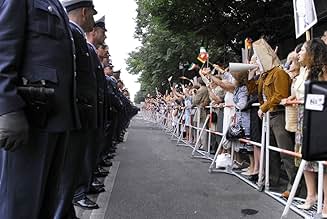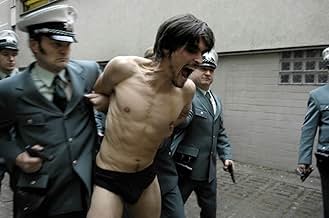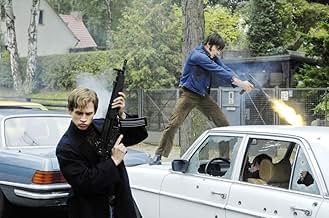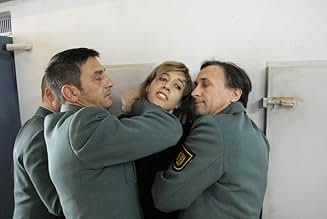NOTE IMDb
7,3/10
41 k
MA NOTE
Un regard sur la faction Armée rouge, le groupe terroriste allemand qui organisa des attentats, des braquages, des enlèvements et des assassinats à la fin des années 1960 et 1970.Un regard sur la faction Armée rouge, le groupe terroriste allemand qui organisa des attentats, des braquages, des enlèvements et des assassinats à la fin des années 1960 et 1970.Un regard sur la faction Armée rouge, le groupe terroriste allemand qui organisa des attentats, des braquages, des enlèvements et des assassinats à la fin des années 1960 et 1970.
- Réalisation
- Scénario
- Casting principal
- Nommé pour 1 Oscar
- 4 victoires et 22 nominations au total
Niels-Bruno Schmidt
- Jan Carl Raspe
- (as Niels Bruno Schmidt)
Hans Werner Meyer
- Klaus-Rainer Röhl
- (as Hans-Werner Meyer)
Avis à la une
I watched the movie at a teacher's screening in Wuppertal on a Sunday morning. I was quite impressed with the accurate and detailed portrayal of the RAF and the events of the so called 'German fall' (Deutscher Herbst). I myself knew of many of the events beforehand and thanks to documentaries such as Veiel's Black Box BRD and Breloer's Todesspiel I was able to compare. For the two and some hours that the movie lasted I was on the edge of my seat. None of the scenes were boring, everything was well paced (at times maybe a little too fast paced) and I felt like I was being taken back to the important past of my native country. However, at the end I felt a little empty. The documentaries I just mentioned focused on only one story, but these documentaries were better because they gave us an in-depth analysis of the opposing forces (the bourgeoisie, the elite and the socialist rebels).
The portrayal of Meinhof and Baader seems accurate, too, but often I wondered if Baader really was the small-time crook he's made out to be in the movie. Except for Meinhof and Ensslin nobody seems to have some really deep thoughts about what was (is) wrong with our society. Mohnhaupt played by Nadja Uhl isn't explained at all, she's just there all of a sudden and we just go along thinking that she is in it for the same reasons as everybody else (Which are???).That way the movie seemed a little biased, as if trying to tell us that the RAF was mainly criminal and not so much political. Although I believe that a lot of their motives were right, even though they didn't justify any of the actions.
Bruno Ganz as Herold is allowed to play his character in a way that everyone thinks of the German government at the time as a dignified and moderate administration although I don't believe that to be true (after all, Herold said that he can only cure the symptoms of the RAF disease but not the disease itself, yet he didn't do anything to make the German people understand that the RAF is not altogether wrong when it accuses the German people of laziness, cowardice and complacency).
Now, leaving the movie, I figured that there was nothing much left to talk about. The teacher material that we received was pretty useless, because it doesn't offer any interesting topics for discussion. I for one think it would be interesting to discuss the present situation (bureaucracy, war in Iraq, terrorism) with the situation of Germany in the 70's. We are still dealing with many of the problems that caused the insurgency and civil disobedience back then, yet today we don't do anything at all. We are dissatisfied with the Bush administration, we oppose the war in Iraq and Afghanistan, we suffer from a financial crisis mainly caused by the deregulated free market economy (capitalism) and we watch the divide between the rich and the poor getting bigger and bigger.
However, the youth of today doesn't protest. Why not? Maybe because we taught them well that in the end it's everyone for themselves and that it's best to be obedient, docile and commonorgarden if you want at least a little security in your life. One of the stronger scenes was the one where Ensslin accuses Meinhof of jerking off on her socialist theories instead of actually doing something. That's where you can see how Meinhof was influenced by the RAF. Finally she met some people who were willing to take action instead of just talking and philosophizing about a better world. This scene lends itself well to the follow-up scene in which Meinhof helps Baader to escape from prison. The jump from the window sill is a the same time a jump towards extremism.
Well, all in all, I think it's a good film to get people interested in Germany's past but it can only be the beginning of a more subtle analysis of what the RAF stood for and what it was trying to do.
The portrayal of Meinhof and Baader seems accurate, too, but often I wondered if Baader really was the small-time crook he's made out to be in the movie. Except for Meinhof and Ensslin nobody seems to have some really deep thoughts about what was (is) wrong with our society. Mohnhaupt played by Nadja Uhl isn't explained at all, she's just there all of a sudden and we just go along thinking that she is in it for the same reasons as everybody else (Which are???).That way the movie seemed a little biased, as if trying to tell us that the RAF was mainly criminal and not so much political. Although I believe that a lot of their motives were right, even though they didn't justify any of the actions.
Bruno Ganz as Herold is allowed to play his character in a way that everyone thinks of the German government at the time as a dignified and moderate administration although I don't believe that to be true (after all, Herold said that he can only cure the symptoms of the RAF disease but not the disease itself, yet he didn't do anything to make the German people understand that the RAF is not altogether wrong when it accuses the German people of laziness, cowardice and complacency).
Now, leaving the movie, I figured that there was nothing much left to talk about. The teacher material that we received was pretty useless, because it doesn't offer any interesting topics for discussion. I for one think it would be interesting to discuss the present situation (bureaucracy, war in Iraq, terrorism) with the situation of Germany in the 70's. We are still dealing with many of the problems that caused the insurgency and civil disobedience back then, yet today we don't do anything at all. We are dissatisfied with the Bush administration, we oppose the war in Iraq and Afghanistan, we suffer from a financial crisis mainly caused by the deregulated free market economy (capitalism) and we watch the divide between the rich and the poor getting bigger and bigger.
However, the youth of today doesn't protest. Why not? Maybe because we taught them well that in the end it's everyone for themselves and that it's best to be obedient, docile and commonorgarden if you want at least a little security in your life. One of the stronger scenes was the one where Ensslin accuses Meinhof of jerking off on her socialist theories instead of actually doing something. That's where you can see how Meinhof was influenced by the RAF. Finally she met some people who were willing to take action instead of just talking and philosophizing about a better world. This scene lends itself well to the follow-up scene in which Meinhof helps Baader to escape from prison. The jump from the window sill is a the same time a jump towards extremism.
Well, all in all, I think it's a good film to get people interested in Germany's past but it can only be the beginning of a more subtle analysis of what the RAF stood for and what it was trying to do.
Although being somewhat more than moderately interested in politics, I knew very little about the original activities on which this film is based. Having seen the film, I now feel vastly more knowledgeable on how world events in the late sixties and early seventies led from the emergence to the demise of this particular left wing faction. My attention was fully engaged throughout the film. I thought the screenplay brilliantly portrayed the way the mindset of the RAF developed as they became more and more convinced they were living in a police state. Acting and direction were superb throughout. In spite of the violence and repression being depicted, I was reassured by the fact that such thought provoking films can and are being made for today's cinema audiences. After seeing Die Welle (I think it was three times) earlier this year I am now very enthusiastic about German cinema and shall certainly be hoping to see Der Baader Meinhof Komplex at least once more on the big screen this year. A masterpiece of political film making. Highly recommended.
I wish to clear up any mistake my summary for this might lead to: This is not poorly done. As for this being good or not, that is perhaps a little more subjective, as it may depend on your opinion of the RAF. This is another of the German films of recent years dealing with awful national situations of theirs, from a couple, to numerous, decades back. Whether it's therapeutic, apologetic, a third option or a mix of several that drives this trend, is up for debate. I find this and Der Untergang(or "Downfall") to be exceptionally well-done. As was also the case with that one, this requires you to pay close attention. The pace comes about as close to being outright overpowering - for two and a half hours straight, mind you - as it can, without crossing the line into it. This does also somewhat expect you to be familiar with the overall occurrences, otherwise, you may be confused and have trouble keeping track and following it. This is rather intense. It is a quite strong piece. Featured is an immense amount of violence, which is often graphic. The attitude towards nudity and sexuality is very relaxed. This is disturbing. It is by no means for the faint of heart, and mainstream audiences, if they give this a chance, should not expect it to be "enjoyable", in the traditional sense. It is not "funny". It is powerful. The cinematography and editing are excellent. The acting performances are beyond reproach. I don't know all the facts, but I understand that this isn't completely historically accurate, though it seems to come fairly close. The production values are incredible. I recommend this to anyone interested in an authentic drama based on the Rote Armee Fraktion. 8/10
Germans have a quality wave of movies that reached wold audience in the early 21st century, after the Run Lola Run hit. This movie is perhaps not the best of the best, but is interesting, original and gives a story of one turbulent era with great detail and precision.
I liked this film primarily of how much it seemed to buck the formulaic American plot system. Don't get me wrong some American movies are cool, but they mostly all adhere to the same boring standards.
This film was incredibly bleak and honest, which I respected very much. Also it required that you think for yourself and develop your own opinions.
The plot revolves around a group of young people who go out to try to make a difference and yet don't really accomplish anything at all. I can't give away too much but I thought this was just beautiful and complex film-making. Very intelligent, it never tried to be cute or force any ideas on you, it simply was.
I know this is a vague review, but if you feel like seeing an intelligent complex drama then you must see this. Go German cinema!
This film was incredibly bleak and honest, which I respected very much. Also it required that you think for yourself and develop your own opinions.
The plot revolves around a group of young people who go out to try to make a difference and yet don't really accomplish anything at all. I can't give away too much but I thought this was just beautiful and complex film-making. Very intelligent, it never tried to be cute or force any ideas on you, it simply was.
I know this is a vague review, but if you feel like seeing an intelligent complex drama then you must see this. Go German cinema!
Le saviez-vous
- AnecdotesAs an immediate reaction to the movie, Ignes Ponto, widow of Jürgen Ponto, whose assassination is portrayed in the movie, returned her Federal Cross of Merit. She was angry that the Federal Republic of Germany has never even created a memorial for victims of the RAF, but instead helped to finance films like this one about the members of the RAF. Also, she said, she had not been warned about the graphic portrayal of Ponto's assassination when she was invited to the movie premiere and felt humiliated by the producers for making her sit through this without a warning. About a month later, she filed a lawsuit against the producers, who claimed that every scene is historically accurate, because the assassination of her husband, which she had to witness from the next room, was not portrayed as it happened. She demands the scene of the murder of her husband be cut from the movie. The filmmakers claim that they had tried to contact her during production to get the scene right but she had no desire to cooperate. Before this movie, there had been no portrayal of Ponto's assassination on film and she felt the staging of the movie was lurid and dishonoring to her husband. As of this writing, no decision has been reached about the lawsuit.
- GaffesUlrike Meinhof's twin daughters Bettina and Regine first appear in the opening scene in 1967 when they are 9 years old. Yet 3 years later when living in Sicily and rescued by Stefan Aust, they haven't aged at all.
- Citations
Ulrike Meinhof: If you throw a stone, it's a crime. If a thousand stones are thrown, that's political. If you set fire to a car it's a crime; if a hundred cars are set on fire that's political.
- ConnexionsFeatured in Guinness World Records - Die größten Weltrekorde: Épisode #5.1 (2008)
- Bandes originalesMercedes Benz
Written by Janis Joplin, Michael McClure
Performed by Janis Joplin
Produced by Paul A. Rothchild
Meilleurs choix
Connectez-vous pour évaluer et suivre la liste de favoris afin de recevoir des recommandations personnalisées
Détails
- Date de sortie
- Pays d’origine
- Site officiel
- Langues
- Aussi connu sous le nom de
- The Baader Meinhof Complex
- Lieux de tournage
- Sociétés de production
- Voir plus de crédits d'entreprise sur IMDbPro
Box-office
- Budget
- 20 000 000 € (estimé)
- Montant brut aux États-Unis et au Canada
- 476 270 $US
- Week-end de sortie aux États-Unis et au Canada
- 17 348 $US
- 23 août 2009
- Montant brut mondial
- 26 937 355 $US
- Durée2 heures 30 minutes
- Couleur
- Mixage
- Rapport de forme
- 1.85 : 1
Contribuer à cette page
Suggérer une modification ou ajouter du contenu manquant

Lacune principale
By what name was La bande à Baader (2008) officially released in India in Hindi?
Répondre




































